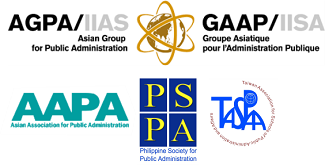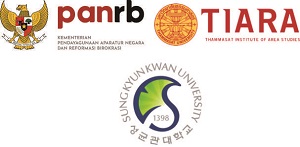Optimising Fiscal Decentralisation: Addressing Financial Management Challenges in Gorontalo Province
Abstract
Fiscal decentralisation is the basic capital to reach better governance, regional development, and fiscal autonomy. This paper discusses financial management barriers and opportunities in the Gorontalo Province, a region with low fiscal autonomy, as shown by its index and heavy dependency on central government transfer. This qualitative research, using data from interviews and document studies, found various inefficiencies in the province, such as incongruence between expenditures and revenues, lack of coordination among stakeholders, non-compliance by taxpayers, and delays in financial reporting. Drawing on the theoretical work of Schick (1998) for a framework for public expenditure management and using empirical evidence, this paper proposes an integrated strategy toward a better fiscal management system, diversification of revenue sources, enhancements in planning techniques, introduction of comprehensive accounting mechanisms, and stakeholder participation. This paper contributes to the debate on fiscal decentralisation by giving practical suggestions on how to achieve fiscal autonomy and promote sustainable development in economically less-developed regions.
Downloads
References
Bajra, U. & Simon, C. (2017). Audit Committees and Financial Reporting Quality: The 8th EU Company Law Directive Perspective. Economic Systems, 42(1), 151–163. https://doi.org/10.1016/j.ecosys.2017.03.002
Bebbington, J., Brown, J., & Frame, B. (2007).Accounting technologies and sustainability assessment models. Ecological economics, 61(2-3), 224-236.
Chenhall, R. (2003). Quantitative stress measurement of elastic deformation using a mechanoluminescent sensor: an intensity ratio model. Review of Scientific Instruments, 28(2), 127–168. https://doi.org/10.1063/1.5024417
Creswell, J. W. (2009). Research methods. JW Creswell, Research design: qualitative, quantitative and mixed methods approaches, 15-17.
Dong, W., Hou, X., & Qin, G. (2023). Research on the carbon emissions reduction effectofgreen taxation under China's Fiscal Decentralization. Sustainability (Switzerland), 15(5), 1–19. https://doi.org/10.3390/su15054591
Fuior, E., & Gutan, V. (2015). The budgeting based on the performance: Conceptual framework and implementation details. Economy Transdisciplinarity Cognition, (1), 70-83.
Gianini, G., Ghemmogne Fossi, L., Mio, C., Caelen, O., Brunie, L., & Damiani, E. (2020). Managiƒng a pool of rules for credit card fraud detection using a game theory-based approach. Future Generation Computer Systems, 102, 549–561. https://doi.org/10.1016/j.future.2019.08.028
Gideta, T., Alam, M., Tolassa, D. (2021). Practices and Challenges of Fiscal Decentralization: A Case of Bedelle Woreda, Oromia Region, Ethiopia. PanAfrican Journal of Governance and Development, 2(2), 50–80.
Iritani, J., Tamaoka, M. (2005). Japanese fiscal structure between central and local governments' welfare assessment of the Trinity Reform of Japan Jun IRITANI * Masayuki TAMAOKA **. Japanese Fiscal Structure between Central and Local Governments Japanese, 12, 23–40.
Jackling, B. and Sullivan, C. (2007). Financial planners in Australia: An evaluation of gaps in technical and behavioral skills. Financial Services Review, 16(3), 211–228.
Kadjintuni, Z., Tontik, D., Darman, D., Rachman, A., Dunggio, T. (2023). Analisis Pengelolaan Keuangan Daerah Terhadap Akuntabilitas Kinerja Pemerintah Kabupaten Boalemo. JISIP (Jurnal Ilmu Sosial dan Pendidikan), 7(1), 200–210. https://doi.org/10.58258/jisip.v7i1.4124
Luo, W., & Liu, Y. (2022). Research on the Impact of Fiscal Decentralization on Governance Performance of Air Pollution: Empirical Evidence of 30 Provinces from C hina. Sustainability (Switzerland), 14(18). https:// doi.org/10.3390/su141811313
Mardiasmo, M. B. A. (2016). PERPAJAKAN–Edisi Terbaru. Penerbit Andi.
Mardiasmo, M. (2013). Assessing Accountability Of Per for mance Measurement System And Local Government Budgetary Management. Gadjah Mada International Journal of Business, 4(3), 373-395.
Mardiasmo, M. A. (2009). Perpajakan Edisi Revisi 2009. Yogyakarta: Andi Offset.
Mardiasmo, D., & MBA, A. (2009). Akuntansi sektor publik. Yogyakarta: Andi.
Mardiasmo, M. (2008, December). Adjustment of Local-Regional Fiscal Balance Systems in the Face of the Regional Proliferation in Indonesia. In Powerpoint Presentation to the Seminar and Workshop of Grand Strategy for Regional Harnessing in Indonesia, Jakarta (Vol. 18).
Mardiasmo. (2018). Perpajakan Edisi Revisi Tahun 2018. Yogyakarta: Penerbit Andi.
Mahdi Sahi, A., Sahi, A. M., Abbas, A. F., & F. A. Khatib, S. (2022). Financial reporting quality of financial institutions: Literature review. Cogent Business and Management, 9(1). https://doi.org/10.1080/23311975.2022.2135210
Maulani, A., Anshori, M. I., & Andriani, N. (2024). Inovasi Teknologi dalam Pemerintahan: Implementasi SIPD sebagai Alat untuk Me nd ukung Opti mali s as i Pe nge lo laan Keuangan Daerah. JIIP-Jurnal Ilmiah Ilmu Pendidikan, 7(2), 1415–1422. https://doi. org/10.54371/jiip.v7i2.3451
Nalukenge, I., Tauringana, V., Joseph Mpeera, N. (2017). Journal of Accounting in Emerging E conomies. Journal of Accounting in Emerging Economies, 11(1), 1–40. https://doi.org/10.1108/jaar.2010.37511aaa.003
Pemerintah Provinsi Gorontalo. (2019). Laporan Realisasi Anggaran (LRA) Provinsi Gorontalo Tahun 2019. Gorontalo: BPKD.
Pemerintah Provinsi Gorontalo. (2020). Laporan Realisasi Anggaran (LRA) Provinsi Gorontalo Tahun 2020. Gorontalo: BPKD.
Pemerintah Provinsi Gorontalo. (2021). Laporan Realisasi Anggaran (LRA) Provinsi Gorontalo Tahun 2021. Gorontalo: BPKD.
Pemerintah Provinsi Gorontalo. (2022). Laporan Realisasi Anggaran (LRA) Provinsi Gorontalo Tahun 2022. Gorontalo: BPKD.
Pemerintah Provinsi Gorontalo. (2023). Laporan Realisasi Anggaran (LRA) Provinsi Gorontalo Tahun 2023. Gorontalo: BPKD.
Pemerintah Provinsi Gorontalo. (2024). Nota Keuangan Anggaran Pendapatan dan Belanja Daerah Tahun 2024. Gorontalo: Sekretariat Daerah.
Kementerian Keuangan Republik Indonesia. (2023). Peraturan Menteri Keuangan Nomor 84 Tahun 2023 Tentang Kapasitas Fiskal Daerah. Jakarta: Kementerian Keuangan.
Pemerintah Provinsi Gorontalo. (2019). Data Transfer Ke Daerah (TKD) Tahun 2019-2023. Gorontalo: BPKD.
Pemerintah Provinsi Gorontalo. (2019). Data Dana Dekonsentrasi dan Tugas Pembantuan (DK/ TP) Tahun 2019-2023. Gorontalo: BPKD.
Pemerintah Provinsi Gorontalo. (2023). Panduan Penyusunan APBD dan RKPD Tahun 2023. Gorontalo: Sekretariat Daerah.
Peetz, J., Robson, J., Xuereb, S. (2021). The Role of Income Volatility and Perceived Locus of Control in Financial Planning Decisions. Frontiers in Psychology, 12(May), 1–13. https://doi.org/10.3389/fpsyg.2021.638043
Sandjaja, F. R., Nafisa, F., & Manurung, I. N. (2020). The Impact of Fiscal Decentralization on Welfare in Selected Provinces in Indonesia. Jurnal Bina Praja, 12(1), 21-31.
Schick, A. (1998). A contemporary approach to public expenditure management. World Bank Institute, 68(1), 2-11.
Siregar, B., & Badrudin, R. (2019). The Evaluation of Fiscal Decentralization in Indonesia Based on the Degree of Regional Autonomy. Journal of Reviews on Global Economics, 8, 611-624.
Soobaroyen, T. & Poorundersing, B. (2008). Effectiveness of management accounting systems: Evidence from functional managers in developing countries Managerial Auditing Journal, 23(2), 187–219. https://doi.org/10.1108/02686900810839866
Teremetskyi, V., Velychko, V., Lialiuk, O., Gutsul, I., Smereka, S., & Sidliar, V. (2021). Challenges for local authorities: the politics and practice of financial management in the way for Sustainable Development. J. Legal Ethical & Regul. Isses, 24, 1.
Udeagha, M. C., & Breitenbach, M. C. (2023a). Can fiscal decentralization be aroute to race to zero emissions in South Africa? Fresh policy insights from the novel dynamic autoregressive distributed lag simulation approach. Environmental Science and Pollution Research, 30(16), 46446–46474. https://doi. org/10.1007/s11356-023-25306-z
Udeagha, M. C., & Breitenbach, M. C. (2023b). Revisiting the nexus between fiscal decentralization and CO2 emissions in South Africa: fresh policy insights. Financial Innovation, 9(1). https://doi.org/10.1186/ s40854-023-00453-x
Xu, B. (2020, April). Performance Management Model of Public Expenditure Based on PDCA Cycle Theory. In 2020 International Conference on E-Commerce and Internet Technology (ECIT) (pp. 216-221). IEEE.
Yeo, K. H. K., Lim, W. M., & Yii, K. J. (2023). Financial planning behavior: A systematic literature review and new theor y development. Journal of Financial Services Marketing, 1–24. https://doi.org/10.1057/s41264-023-00249-1
Zeng, Y. (2022). Neural network technology- based optimization framework of financial and management accounting models Computational Intelligence and Neuro science, 2022, 1–9. https://doi.org/10.1155/2022/4991244
Zhang, Q., Nakatani, R., & G arcia Valdes, I. (2022). Fiscal Decentralization Improves Social Outcoms When Countries Have Good Governance. IMF Working Papers, 2022(111), 1. https://doi.org/10.5089/9798400211768.001

This work is licensed under a Creative Commons Attribution-ShareAlike 4.0 International License.





